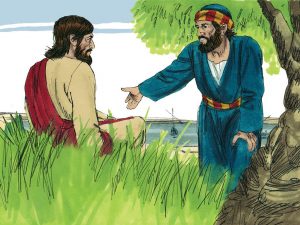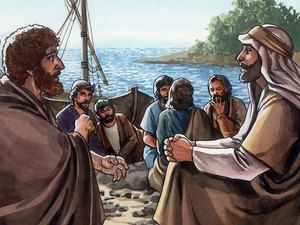Building Up Love – (No) Records of Wrongs
Records: an account in writing or the like preserving the memory or knowledge of facts or events.1
Wrongs: not correct in action, judgment, opinion, method, etc., as a person; in error; an injustice2
Forgive: to give up all claim3
…[love] keeps no record of wrongs… (1 Corinthians 13:5d)
An eye for an eye. It’s only fair. They cheated me, so I’m going to cheat them. They hurt me, so I’m going to hurt them. They (fill in the blank), so I’m going to do the same to them. Are these your expressions? Is this you? It can be physical or emotional. Did someone forget your birthday or anniversary, or other important event? Do you keep a mental tally of all the “wrongs” committed against you? Maybe you bring them up when you want to win an argument. Are these the actions of love?
 21Then Peter came to Jesus and asked, “Lord, how many times shall I forgive my brother or sister who sins against me? Up to seven times?”
21Then Peter came to Jesus and asked, “Lord, how many times shall I forgive my brother or sister who sins against me? Up to seven times?”
22 Jesus answered, “I tell you, not seven times, but seventy-seven times…forgive your brother or sister from your heart.” (Matthew 18:21-22, 35b NIV)
Did Peter struggle to forgive? It would not be surprising. Forgiveness is something with which many of us struggle. Jesus was not telling Peter to keep a running tally of how many times he has granted forgiveness, but rather Jesus is teaching Peter, and all who are listening, that forgiveness should be unlimited. Forgiveness from the heart is forgiveness with love. Love lets go of the past, lets go of any wrongs committed, and grants full and complete forgiveness. Love is not about getting even. Love keeps no records of wrongs.
34Jesus said, “Father, forgive them, for they do not know what they are doing.” (Luke 23:34a, NIV)
No one deserves the forgiveness of Jesus Christ. Yet, it has been given to all, if we are willing to accept it. As Jesus was dying, as He was sacrificing His life for ours, as He was suffering, Jesus was concerned about our welfare. As He faced the consequences for every sin you committed, Jesus beseeched His Father for forgiveness. Would the welfare of others be your concern at a moment like that?
When Jesus warned the disciples that one of their number will betray Him, Peter insisted that it could not be him (add reference). Less than 12 hours later, Peter had denied Jesus three times. Peter felt deep regret and remorse for his actions. What happened when Peter finally faced Jesus after Jesus’ resurrection?
15When they had finished eating, Jesus said to Simon Peter, “Simon son of John, do you love me more than these?”
“Yes, Lord,” he said, “you know that I love you.”
Jesus said, “Feed my lambs.”
16Again Jesus said, “Simon son of John, do you love me?”
He answered, “Yes, Lord, you know that I love you.”
Jesus said, “Take care of my sheep.”
17The third time he said to him, “Simon son of John, do you love me?”
Peter was hurt because Jesus asked him the third time, “Do you love me?” He said, “Lord, you know all things; you know that I love you.”
Jesus said, “Feed my sheep. 18Very truly I tell you, when you were younger you dressed yourself and went where you wanted; but when you are old you will stretch out your hands, and someone else will dress you and lead you where you do not want to go.” 19Jesus said this to indicate the kind of death by which Peter would glorify God. Then he said to him, “Follow me!” (John 21:15-19, NIV)
Peter is finally facing Jesus. Jesus! The Son of God, the Christ, the Savior of all mankind, whom Peter had heard about all his life. This was who Peter had betrayed! This was who Peter had denied! This was who Peter had wronged. Can you put yourself in Peter’s sandals?
Imagine the scene: Peter was sitting next to Jesus around a campfire, fish cooking. Jesus, the man from which Peter had spent three years following and learning, was the Son of God, the Christ, resurrected from the dead. As Peter shuffled the food around awkwardly on his plate his mind was reeling. Peter had seen Jesus perform miracles, and heard His wisdom in teachings. Yet Peter had denied Him. How could such a betrayal ever be righted?
 Eyes downcast, Peter kept stealing glances at the man next to him, waiting for his reproach. Peter wanted to say something, defend himself, but he knew his actions were indefensible. He now knew and understood that he had denied and rejected the Son of God! Three times! And the Son of God knew it! The regret and remorse Peter felt, didn’t feel enough to make up for what he had done.
Eyes downcast, Peter kept stealing glances at the man next to him, waiting for his reproach. Peter wanted to say something, defend himself, but he knew his actions were indefensible. He now knew and understood that he had denied and rejected the Son of God! Three times! And the Son of God knew it! The regret and remorse Peter felt, didn’t feel enough to make up for what he had done.
The moment had come. Jesus turned to Peter, asking Peter the same question three times, “Do you love me?” Did Jesus doubt Peter’s love? No! Of course not! Jesus knew Peter’s heart, knew exactly what he was feeling. Each question struck Peter deeply. His worst fears were being confirmed: Jesus, the Christ, was doubting him after his denial, Jesus, the Christ, no longer trusted him. But, as usual, Peter was overreacting. Jesus didn’t doubt Peter – the opposite – Jesus, the Son of God, the Christ, knew the man and leader Peter was going to become. Jesus, the Christ, acting as a man, questioned Peter, providing Peter with an opportunity to overcome his betrayal. Peter denied Jesus, the Christ and the man, three times. Jesus, the Christ, questioned Peter three times, restoring Peter as a disciple, erasing his denial. Jesus, the Christ, through His sacrifice had already forgiven Peter. Jesus, the man, forgave Peter before Peter ever denied Him!
 Jesus, as the Christ or as a man, kept no records of wrongs. Jesus was not punishing Peter for his rejection by questioning him. Rather, Jesus was doing what was needed to restore Peter: reminding Peter of His love for him.
Jesus, as the Christ or as a man, kept no records of wrongs. Jesus was not punishing Peter for his rejection by questioning him. Rather, Jesus was doing what was needed to restore Peter: reminding Peter of His love for him.
Think about the world today. Does it keep records of wrongs? The phrase “cancel culture” has entered our lexicon, and it is becoming increasingly more common. Say or do the wrong thing and your entire history is up for examination and scrutiny. Mistakes made days, weeks, or years ago can lead to you, or even your family, being fired from jobs. And, all too often, no apology is sufficient and people are not allowed to learn and grow from their mistakes. How would Peter’s story have turned out in today’s world of “cancel culture”?
Jesus, the Christ and the man, was not going to continually remind Peter of his mistakes. Rather, after their conversation on the beach, Jesus would never again convict Peter for his denial. Peter would continue to sin and make mistakes throughout the rest of his life. Peter would continue to feel remorse for his actions that fateful night. No doubt Peter was reminded by others of his failures. But Jesus, the Christ and the man, would never again convict Peter. He kept no records of wrongs. Peter was forgiven in full. Do you give forgiveness in full? Is your forgiveness complete? Or is there something on to which you are holding? Let it go! Love keeps no records of wrongs.
1https://www.dictionary.com/browse/record
2https://www.dictionary.com/browse/wrong#
3https://www.dictionary.com/browse/forgive#
Love is patient, love is kind, it does not envy, it does not boast, it is not proud, it does not dishonor others, it is not self-seeking, it is not easily anger, it keeps no records of wrongs…
For more information regarding how your financial support can help, please click here.
